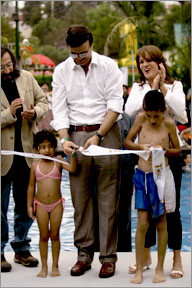Child cocoa workers still 'exploited'
|

Accompanied by two children in bathing suits, Mexico City Mayor
Marcelo Ebrard, center, cut the innaugural ribbon during the opening
day of Mexico City's first of four city beaches,Tuesday, April 3,
2007. Mexico City mayor's plan to build four beaches in this smoggy
mountain capital has been lampooned as a joke and a waste of money
by Mexico's rich, who spend their vacations at real beachside
resorts. But the leftist mayor's supporters welcome the sand as a
city getaway for millions of poor residents of Mexico City area who
have never seen a beach in their lives. -AP
|
Travelling deep into the plantations of the Ivory Coast - the West
African nation that produces half the world's cocoa - children carrying
machetes are a common sight.
They are being kept out of school and many have untreated wounds on
their legs, where they have cut themselves when working in the cocoa
plantations.
"I used to go to school," said Marc Yao Kwame, who works with his
brother Fabrice on a remote farm. "But my father has no-one to work on
the farm, so he took me out of school. "My mother's a long way from
here. I haven't seen her for 10 years - since I was two years old."
All this should have stopped by now. In 2001, under pressure from the
US Congress, the chocolate manufacturers promised to start eradicating
forced child labour. They failed to meet an initial deadline of 2005,
were given until 2008, and now patience is running out.
Next year, Congress is expected to draft legislation against the
global chocolate industry, unless serious inroads are finally made
against children being forced to work on cocoa farms.
"The deadline came and went and we were very unhappy," says Democrat
Congressman Eliot Engel, who initiated the original agreement known as
the Cocoa Protocol.
"They now need to live up to that agreement. If they don't,
personally I would be for implementing some sanctions, because I think
six years is enough." "They know they can no longer do business the way
they did business before," warns Donald Payne, the new Democrat chair of
the Africa sub-committee. "We're going to work all we can to get the
industry to stop these abuses."
The Ivory Coast Government holds up the village of Petit Yammousoukro
as a model project being run under the Cocoa Protocol to take children
off the cocoa farms. The village square is arid dirt, and at one end is
a school building that is meant to be the chocolate industry's showpiece
in keeping its promise.
The school is a mud hut, with a straw roof and a gap in the wall for
a window. When we visited, there were about 50 children inside, their
ages ranging from early teens down to three or four. All had been
farming cocoa. Many bore the scars of machete injury. All reacted with
horror at the prospect of going back.
But the hut was built by the villagers themselves. The wooden desks
and a blackboard were paid for by the American Government's
international development agency (USAID).
"We opened this in January," said Georges Atta K. Bredou, the village
official in charge of the pilot project. "This January?" I asked. "Yes.
We started building in November last year."
That is a full five years after the Cocoa Protocol was signed - yet
it has been known for years that children in their thousands are put to
work in appalling conditions on the cocoa farms.
Mr. Bredou explained that 40 schools had been earmarked for the Oume
Prefecture, which included the village. But only six mud hut schools
like the one we were in had actually been built. And when we went to the
regional office, we found out why.
"We haven't seen any of the money," said Thomas Lasme, the Oume
general secretary who is overseeing the pilot projects. "We need
everything: money, training, vehicles to take the children from the
plantations, places for the children to stay. We don't have anything to
make this project work."
Neither the British nor American chocolate manufacturers knew details
about the model project in Petit Yammousoukro. "Oume was one of the
districts we worked in," said Alison Ward of the Biscuit, Cake,
Chocolate and Confectionery Association in London.
"What we need to do is work with the governments in West Africa, work
with experts to really make a difference on the ground. That's what
we're determined to do and that's what we're going to do."
"This is a long term project," explained Susan Smith of the Chocolate
Manufacturers Association in the United States. "I think I've learned
that they're moving forward on pilots." Having already broken their
agreement for 2005, Congressman Eliot Engel is closely watching the
manufacturers' progress.
"No-one's going to get a second chance to fool me," he said, adding
that if the industry missed the 2008 deadline, he would sit down with
colleagues and would begin to implement legislation. "The bottom line is
to stop child slavery," he said.
BBC
|
